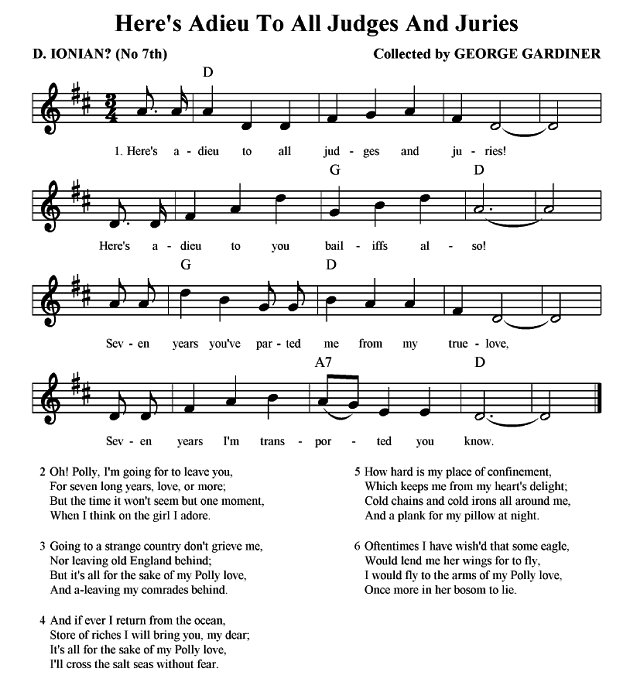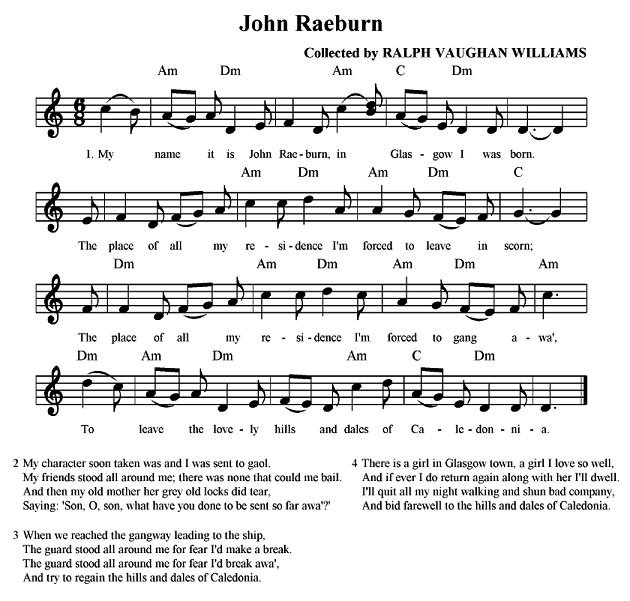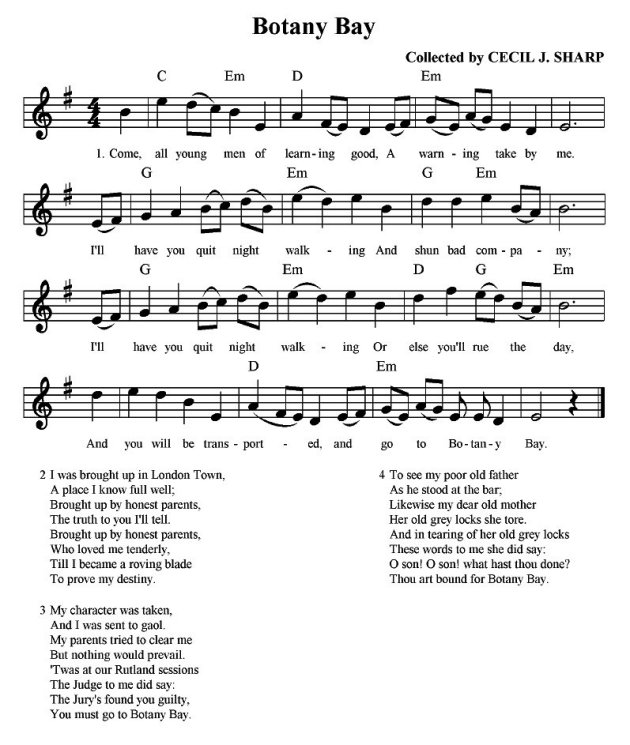
It is common knowledge that the new information technologies open up exciting possibilities to the folk song scholar. In the Autumn 2004 edition of English Dance and Song, for example, I demonstrated how the Gale Corporation's full text historical database of The Times can be used to dig out valuable information on the popular folk song topic of poaching. Now, from the same company, we have '19th Century British Library Newspapers'. Luckily, my university subscribes to this database too, so I was able to use it to discover more about transportation, another common theme in traditional song.
There are well over twenty thousand search hits for the word 'transportation' in the texts of these newspapers between 1800 and 1850. Here are some typical examples from 1800.
On 21 April the Aberdeen Journal reported that, before the Circuit Court of Judiciary at Dumfries, James Miller had confessed to stealing a trunk full of clothing and was sentenced to transportation for five years. On 6 September The Ipswich Journal tells us that a female convict sentenced to be transported had gone blind during her captivity and had consequently been pardoned and sent back to her parish in Norwich. According to the same newspaper (18 October) at the Derby Quarter Sessions seven years transportation was inflicted upon J Farmsworth for rioting. On 8 December the Caledonian Mercury recorded that James Balmer, a prisoner under sentence of transportation, had escaped from Jedburgh Prison.
And so it goes on, year after year. For the first three decades of the nineteenth century there is a seemingly unending list of such cases. Transportation was a common, every day sentence in our law courts. It occasioned little if any public debate and there is no mention of it in newspaper headlines. It was inflicted unheedingly, almost casually, and often for comparatively minor offenses.
In the 1830s, however, things began to change. A search for 'transportation' as a key word in newspaper reports from 1830 to 1850 results in a mere 89 hits, and the first of these was not until 1832, in The Hull Packet and Humber Mercury of 31 January. There, under the ironic title 'Comforts of Transportation,' reports from Australia were used to discredit a claim made in the House of Commons 'that any man wishing to acquire wealth and comfort had only to commit a crime punishable by transportation to Van Diemen's Land or Botany Bay.' The truth, reported the newspaper, was far different; severe privations were suffered even by 'a well-disposed prisoner.' These included '50 lashes, or 10 days' work on the treadmill, or in the chain gang,' even for the most trivial misdemeanours. The 'refractory' could expect even worse treatment culminating in imprisonment at 'Macquire Harbour, Port Macquarie, Norfolk Island, or Moreton Bay, ... where every rigidity of discipline - nay, sometimes even cruelty - is exercised.'
The Newcastle Courant and The Caledonian Mercury followed with similar reports, and later other newspapers joined in too. The Belfast News-Letter of 4 November 1836, for example, gave graphic details of the 'Horrors of Transportation' and concluded that 'death itself must be a blessing compared with the sufferings of this terrestrial hell.' Soon the emergent radical press joined in the debate. On 11 November 1837 the Northern Liberator claimed that the Tory MP Hodgson Hinde had committed offences similar to those trumped up against the Tolpuddle Martyrs and should thus, like them, be transported.
In 1838 a number of newspapers, including The Champion and Weekly Herald on 16 September, reported a Parliamentary Committee's recommendation that transportation should be discontinued. One reason for this was that certain criminal elements, particularly in the metropolis, were not sufficiently deterred by its threat. The practice of transportation continued, however, and there were reports in several newspapers, including The Leeds Mercury on 8 February 1840, of Frost, Williams and Jones, three Chartist leaders who had been sentenced to deportation. Their journey from Monmouth Gaol to their port of embarkation was described, and there were details of a force of Lancers used to deter civil unrest.
On 5 April 1840 The Champion and Weekly Herald carried another report on transportation, this time from the Liverpool Assizes where the young Charles Dolphus was charged with unlawfully returning to England before his sentence was finished. The accused gave the most graphic description of the horrors that he had endured in Australia, but the judge replied that he had no discretion; he was constrained by law to transport the convict back there for life.
By now press coverage of the issue was frequent; in the early 1840s there were at least a dozen stories with the headline 'The Horrors of Transportation' and many others covering similar themes. The end came in 1847. This report, 'Suspension of Transportation,' is from the Hampshire Telegraph and Sussex Chronicle dated 10 April:
The following official letter from the office of the Secretary of State has been forwarded to the visiting magistrates of the different jails in the country: -'Gentlemen, - I am directed by Secretary Sir George Grey to acquaint you that in consequence of the suspension of transportation of male convicts to Van Diemen's Land, it will be requisite to make immediate provision for the confinement and employment, in this country, of a great number of such offenders.'This abrupt change of policy came about quite quickly. The French Revolution was defeated, Napoleon was dead, and the nation was secure. Draconian laws and draconian punishments could be therefore be relaxed and, after the agitation for the Great Reform Bill of 1832, vicious, vindictive, atavistic Toryism was in decline. Here is the continuation of the Northern Liberator's previously cited argument against Hodgson Hinde, MP:
That gentleman has a clear right to entertain any political opinions he pleases. Our object is to show ... that the very laws which his party enacted, in Pitt's reign of terror and ... Castlereagh's despotism of massacre and murder, would, were they fairly put in force, consign him and his associates to a pilgrimage to Botany Bay.Typical of the new enlightenment were more humane opinions and treatment of female convicts, now regarded as in need of help rather than punishment. On 18 January 1846, for example, Lloyd's Weekly London Newspaper alluded to the appalling conditions that women suffered at 'a barrack called the Brickfield Factory, an abode of horrors not to be described' where 'moral depravity is worse than physical suffering.' Now, however, the authorities had sent out 'Mrs Bowden, the intelligent and exemplary matron of the lunatic asylum at Hanwell,' to put things right. The theme was taken up by other newspapers in reports that described Mrs Bowden's new philosophy and approach.
The brutal hardships and horrendous sufferings of those of our forebears sentenced to transportation are now mercifully at an end. What endures, however, is the folk song heritage that transportation inspired. There are numerous references, some of them to superb songs, on the Traditional Ballad Index, the Roud Index and the Digital Tradition database. Here are three of my favourites, to which I have added my own chords for the guitar, etc.
You will find this song on page 39 of Frank Purslow (1972) The Constant Lovers. It was collected by George Gardiner in Hampshire in 1906. To play tune as a MIDI file, click here.

|
Well, that was a good rollicking tune in the Ionian mode (D major). Here is a song with a Dorian melody, more plangent and haunting. It is number 62 in Roy Palmer's excellent Folk Songs Collected by Ralph Vaughan Williams (1983). In this, and also in the third song, 'night walking' means, in the words of Webster's Revised Unabridged Dictionary (1913), 'walking the streets at night with evil designs.' To play tune as a MIDI file, click here.

|
But my personal favourite is this song, collected by the great Cecil Sharp himself. You will find it at number 86 in his One Hundred English Folksongs (1916). To play tune as a MIDI file, click here.

|
Lewis Jones - 3.3.09
Article MT222
| Top | Home Page | MT Records | Articles | Reviews | News | Editorial | Map |